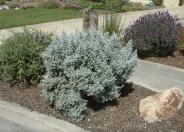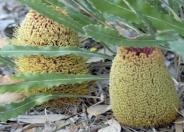
Common name:Smooth Agave
Botanical name:Agave desmetiana 'Variegata'
Agave with an open rosette form grows quickly to 3' x 3'. Very attractive plant resembles Octopus Agave but smaller. Fleshy leaves are light green with smooth edges and a sharp tip. Will grow best in filtered sun or full shade. After several years, flowe

Common name:Cushion Bush
Botanical name:Leucophyta brownii
Cushion Bush is a low mounding shrub that grows 1-3' tall and 2-3' wide. It has tiny, narrow, silver green foliage that makes it an outstanding accent plant. Tiny yellow flowers appear on the end of the stems in spring and summer. This plant does well in full to part sun with minimal water. It tolerates coastal and windy conditions well. If regularly pruned, this shrub will maintain its density and longevity. It does best in well draining soil. Be careful not to overwater.

Common name:Chocolate Mint Scented Geranium
Botanical name:Pelargonium 'Chocolate Mint'
An attractive perennial from So. Africa that cascades and spreads up to 4' and growing 2' tall. Winter foliage is soft, pale green with maroon splotches around the veins, then changing to dark green leaves by summer. Smells of mint, not chocolate. It does best in full sun with regular watering in warm inland valleys. In coastal areas, minimum irrigation is needed. In spring and early summer, pale lavender flowers with reddish centers appear. Use in containers or edging along pathways. Use leaves for cooking or create a fragrant bouquet.

Common name:Creeping Banksia
Botanical name:Banksia repens
Spreading prostrate shrub with fern-like foliage and yellow-brown to dull red flowers in winter-summer. Tolerant of most well-drained soils in full sun position. Drought and frost tolerant. Useful for erosion control, embankment planting and containers. It reaches about 1' tall and may spread up to 6' wide. Thus, a great plant for ground covers too. This evergreen plant does best in sandy soil. Use for cut flowers. From Western Australia.
Designer: Cricket Riley
Photographer: Vicki Anderson
Incorporate compost 6" into your soil to retain water, reduce compaction, feed earthworms, and provide valuable nutrients to your plants.
Remove irrigation water and fertilizer from areas where you don't want weeds to grow.